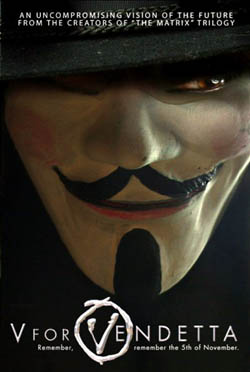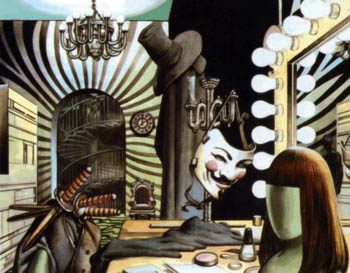 What’s more strange than seeing a bunch of people wearing pajamas pretending to be Jedi? How about hundreds of Comic Con attendees meandering about with Guy Fawkes masks casually slung over their heads like sunglasses at the ready?
What’s more strange than seeing a bunch of people wearing pajamas pretending to be Jedi? How about hundreds of Comic Con attendees meandering about with Guy Fawkes masks casually slung over their heads like sunglasses at the ready?
On Friday morning, day two of San Diego’s Comic Con International 2005, Warner Brothers premiered the V For Vendetta trailer, and apparently gave out V’s signature mask to swag-happy attendees and aspiring polibureau demolition experts. Only at Comic Con could a symbol of failed British terrorism be so flagrantly displayed a week after an example of successful British terrorism.
I hadn’t planned to sit in on the roundtable that ensued, so I didn’t see the trailer. But I slid into the room at the last minute, where from the back I watched as the front row of reporters stepped on each other to not ask the one obvious question: would the British release of V, currently planned for not-quite-Guy-Fawkes-Day the 3rd of November, be pushed back? So if that’s what you’re looking for, how about seeing some readers get smoked in Ron instead?
accent. Was that a challenge?
Natalie Portman: Yeah, I guess it was. I worked with the dialogue coach
Barbara Berkery for a month and a half before we started shooting, and she was
with me the whole time. We’d do exercises for an hour every morning before we
started. So I was pretty comfortable with it before we started, but it’s
definitely an extra challenge to think about.
Joel Silver: She spoke with the accent for the entire movie; during
the day, when we were off set, everything.
Q: Can you talk about why
is such an important stop for a film like this?
JS: V for Vendetta comes
from a graphic novel. So it’s uniquely suited for a convention like this.
They’re finding that everything that deals with the genre seems to be drawn to Comic
Con, but this is very suited because it’s a comic book. But it’s a great place
to launch something because the viral internet connection between the convention
and the world is enormous. It’s an epidemic. If something is cool or effective
and works here, people everywhere seem to know about it. And I think that it’s
run very well, and I feel like we have friends here. This is a group that understands
what we’ve done.
Q: Natalie, do you get more interaction with fans here?
NP: They seem really passionate about the comic book and the
film. They’re united in that. I’ve seen it in other places for smaller things –
people who are into food or anything else that unties people where they can
find friendship in loving something together. It’s a community.
 Q: Do you have anything like that, that’s a passion outside
Q: Do you have anything like that, that’s a passion outside
of your career?
NP: Something…hm, that’s sad. I haven’t done anything like
this convention. But I like music a lot, and I would travel far to see a band I
like if I had the time and cash to do it. If I found myself in a position where
I was able to, I’d do that.
Q: When you read the script and saw that your head had to be
shaved, did you originally want to use a skull cap, or avoid the actual
shearing somehow?
NP: Actually, the first time I met Larry and James McTeigue
– I auditioned for them – they asked if I would shave, and I said yeah! [Laughs]
Everyone else made a bigger deal out of it than I did.
Q: It seems like the brothers, who acted as second unit
directors, have done more on this film than typical second unit directors
would.
JS: Well, it’s the boys’ vision. Actually, no. It’s David
Lloyd and Alan Moore’s vision, and then [the Wachowskis] took their vision and
crafted a script, which they wrote even before we made The Matrix. Their first draft of V For Vendetta was written years ago, and they came back to it
after The Matrix Revolutions, and
they gave James the chance to direct the picture. But they were there every
day; they were on the set and very involved with the look and the feel of the
movie. So it’s a Wachowski Brothers movie…yeah, it’s directed by James, produced
by myself and Grant, but it’s a Wachowski Brothers movie.
NP: You said a ‘normal’ second unit director – they’re also
the producers and the writers, which is already more than most second unit
directors. So just in that nature – I’ve seen writers be as involved as they
were. And they really did let James…he did have a chance to create his own
vision and do his own work. They were helping, you know, with ideas as writers
and producers and second unit directors. They had several roles.
Grant Hill: They’re interesting. Obviously there’s a key family group
that has developed through the Matrix films
and into this. Larry and Andy developed a strong relationship with James, as
well as several of the other key people around. It’s very much a sort of
symbiotic thing. It’s very hard to sort out where the demarcation lines are.
They very much are in it for James to make his movie, as Natalie has said. But
they wrote it, and were very heavily involved in producing, and fundamentally
want to make a good movie, and give James the chance to do that.
Q: Natalie, from Besson to Lucas, do you find that working
with a European director versus an American one has notable differences that
inform your performance?
NP: I think it’s more an individual difference than a European/American
difference. I guess I’ve worked with a few non-Americans, though not all were European,
so it’s hard to make continental generalizations. But individual differences,
all over the place. Anthony Minghella will shout things at you in the middle of
a scene. Other directors might be completely silent and never say anything.
Woody Allen I don’t think ever said anything to me the whole time I worked with
him. [Laughs] I don’t think he knows I worked with him! It is a very individual
difference that I think has to do with personalities.
Q: In the comic, V is a terrorist, but a good guy at the
same time. How do you handle that?
David Lloyd: I think I’d better answer that. You say he’s a
good guy, but I don’t know that he is a
good guy. He’s good in one sense, but he’s also a homicidal maniac, and you
need to bear that in mind. I mean, he’s not heroic in the sense that he only
kills people who deserve to be killed. He has complete and absolute dedication
to wreaking vengeance on people who maybe have changed their ways and reformed.
He’s not really a good guy, and I think that’s kept in the film. He’s very
complicated. He’s a great character. I was quite disturbed when the whole idea
of making a
so easy to make him a Good Guy. In fact, he’s not. He has a lot of traits of
the terrorists who wreaked havoc on
last week. That complication, those nuances, are still in the screenplay and
the adaptation, and I think that’s really good.

Q: Joel, you have a penchant for doing projects that make big
movies. When I think Joel Silver, I think ‘big picture’. When you got the book,
what did you think?
NP: Art house film!
 JS: I don’t think my movies are always big, but thank you. I
JS: I don’t think my movies are always big, but thank you. I
acquired this thing many years ago, in the late ‘80s. I acquired it when I got Watchmen – I had them both. And I was
not able to hold onto Watchmen, but I
did hold onto this. I was intrigued by it. It was black and white galleys of a
book that hadn’t even come to
It was just beginning to be seen by people, and I was intrigued by this incredibly
weird society, and the story of the guy and the girl. It could be a great
movie, and that’s how you do it. Twenty years later, it’s finally happening. It
excited me, and I thought that we could find a way to make it great. And the
boys’ original script was effective, but not anywhere near as strong as it
became when they went back and wrote it again.
Q: Is Watchmen now
totally out of your grasp?
JS: It’s one of the only DC comics that actually left the
Warner Brothers fold. I was at Fox at the time, and I had acquired it at Fox,
so that when I went back to Warners it was gone. Now it’s moved around. And so
many pieces of material have come out that tread on Watchmen territory that I don’t know how…when it came out, it was a
blinding beacon. But now it might seem derivative, because so many things have
followed that are based on ideas that were in that book.
Q: Natalie, what do you think of the message of the movie?
NP: I don’t think there necessarily is a message. I think
that’s part of what David was saying. It’s not a manipulative story that says,
‘this person is the good guy, you should fall in love with him.’ You definitely
have one person who you can probably identify with morally, but he’s heavily
flawed, and you an also criticize him morally. It’s more of a provocative piece
than a ‘this is what you should think’ piece. It’s trying to make you think and
make you criticize and object, and find faults in someone’s ideology. It’s not
black and white, and that’s one of the reasons I really liked it. It made me
have questions that I couldn’t answer, or that I had different answers to every
five minutes, and it continues to be that way for me. Things that explore how
we deal with violence are very interesting to me, because we have many
variations for how we categorize violence. Was it intended or not? Was it state
or individually sanctioned? And with all these things we make moral judgments
based on these categorizations, and sometimes those categorizations are in the
eye of the beholder. That’s why some people watching this movie will identify
with the government, and some will identify with V. That openness and ambiguity
was interesting.
Q: Natalie, are you finding strong material for women?
at all, for women or for men. And for me, I have been able to find stuff that
I’m interested in, and when I don’t, I like not working, too. Not working is
pretty fun. [Laughs] I think if you can’t find interesting stuff, then you make
something or do something interesting that’s not movies. There’s plenty of interesting
things to do that aren’t movies, so I wouldn’t bitch about it.